The Meta Keywords tag is a tag that appears in the HTML code of a Web page and lists the keywords and the most important expressions of this page. It is now completely obsolete, but was once used to indicate to search engines, the keywords that describe the content of a web page. It is no longer considered by Google and no longer plays any role in SEO.
The time when we stuffed keywords in meta Keywords tags tags to get a better SEO positioning in search engines is long gone
Over the years, the value of this tag has decreased. The major search engines have since improved their algorithm and introduced many factors to evaluate the ranking of a page without taking into account the meta Keywords tag.
But first :
- What is this tag?
- Why is it no longer relevant for Google?
- Which search engines still use it?
- Should you still care about it?
- What is the difference between this meta Keywords tag and keywords?
- If it is no longer valid for Google, what should you do?
These are all questions I will be using throughout this guide.
So let’s go!
Chapter 1 : Understanding meta Keywords tags
In this chapter, I’m going to talk about several points that will allow you to have all the necessary information about the meta Keywords tag
Let’s get started!
1.1. what are meta Keywords tags ?
The meta keywords tag is a fragment of code used to indicate a list of keywords relevant to a particular page. This list of keywords is different from the classic keywords, because it appears “internally” in the source code of your page instead of on the live web page

In the content part of the Keywords meta tag, you are supposed to provide the keywords for which you want the specific page to be ranked in search engines.
Search engines read this attribute as part of the crawling process as well as indexing and use them in the ranking process.
As some meta tagstags, the meta Keywords are not visible to the user, but they are part of the source code of the Web page.
To view the meta Keywords (or any other meta tag) that a page uses, do the following:
- Open the page in a web browser
- Make a click on the right button of your mouse ;
- You will then find ”Show the source code of the page” and click on it.
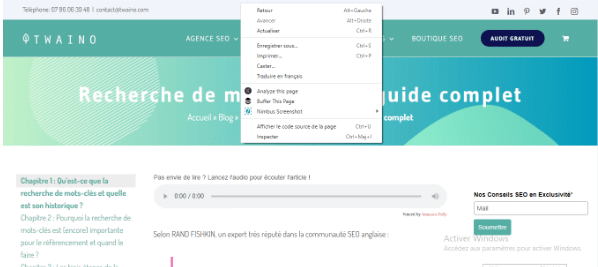
Here are the meta tags used for the page below:

Syntax of the Meta Keywords tag
The meta keywords tag must be placed in the HTML code of the page in the section section. It looks like this:
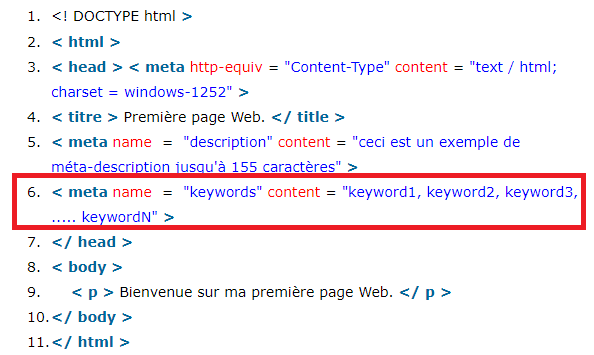
However, at the moment, Google no longer considers the meta keywords tag tags in its ranking algorithm, as they are too easy to abuse
SEO specialists have used this feature to their own advantage by trying to enter a lot of keywords. Often, these keywords specified in the attribute do not match the content of the page.
For this reason, Google and other search engines have downgraded this tag. In the following section, you will find more details about the fall of the meta Keywords tag.
1.2. The fall of the Meta Keywords tags
In the early 1990s and 2000, the meta keywords were used in a reasonable way by webmasters
However, as the competition for the ranking of pages became more and more rigorous, SEO professionals began to abuse of this meta keyword tag.
The practices of Black Hat SEO practices such as keyword stuffing started to become the norm in order to dominate the search engine ranking pages (SERPs).
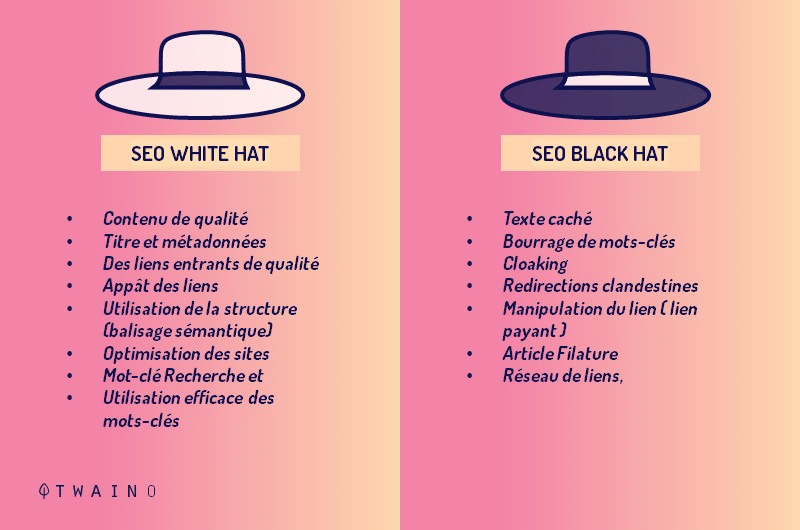
SEOs would load the meta Keywords field with keyword phrases that were only marginally relevant to the page’s content
Some would even use up to 50 of these keywords just to increase their chances of ranking high in the SERPs.
In addition, some SEO practitioners would also use completely irrelevant, but high volume keywords to supplement the organic traffic statistics.
This was usually done by SEOs to take advantage of any failures in search engine algorithms
Others argued that it was simply a way to take full advantage of the opportunity to cover as many legitimate keywords as possible.
These practices of overuse and misuse led to the tag’s inability to provide meaningful ranking data. This made it very easy to manipulate search algorithms.
As a result, search engine results became cluttered with results that had nothing to do with the searchers’ queries
To finish with all this, the main search engines decided to remove the meta Keywords tags from their ranking process.
In particular:
- Google a abandoned the meta Keywords tag in 2009;
- Yahoo a stopped using meta keywords in 2009;
- Bing a announced in 2014 that it no longer considered meta Keywords for ranking purposes
1.3. Which search engines still use meta Keywords tags?
This may come as a surprise to many people, but two major search engines still use meta Keywords as part of the ranking process.
Here they are:
- Yandex – The most popular Russian search engine uses meta keywords to determine page relevance for search queries;
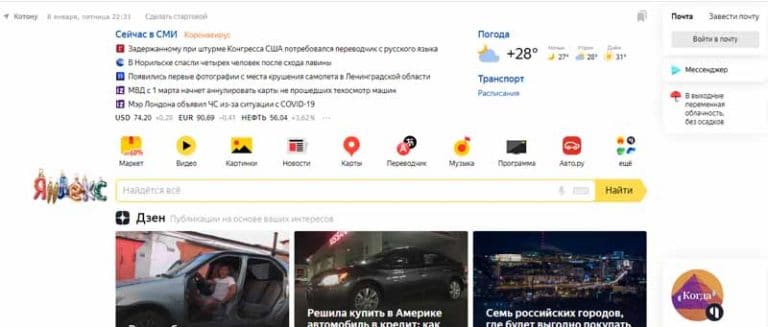
- Baidu – The most popular Chinese search engine, also uses meta keywords tag during the crawling and ranking phase.
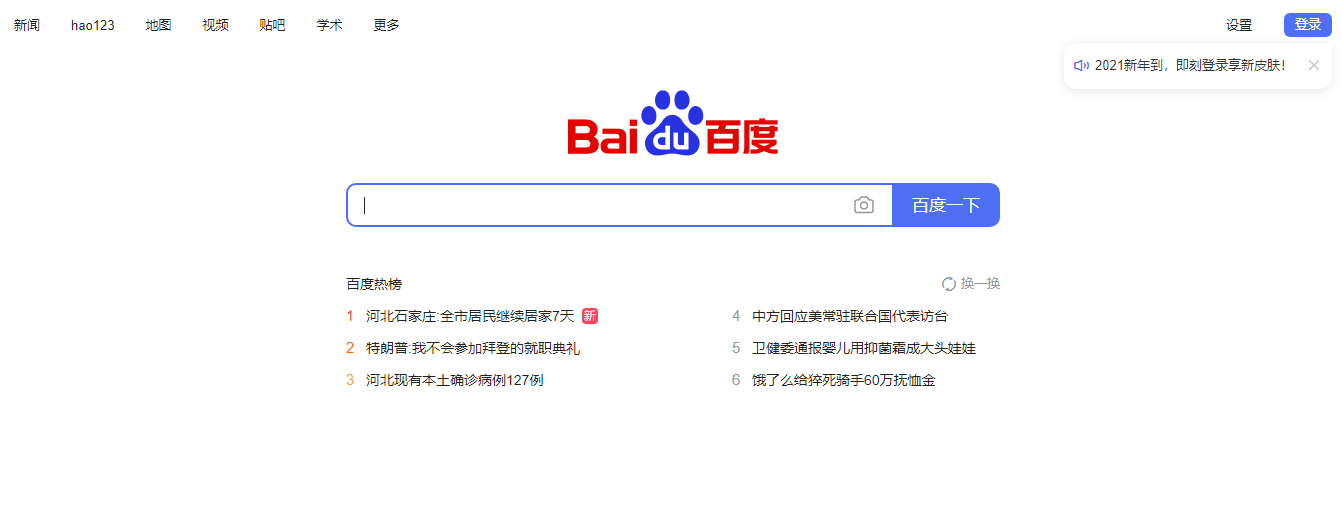
1.4. Should you always care about the meta keywords tag?
It depends on the case. If you care about organic traffic from Yandex and Baiduyou can leave the meta keywords that are already in your pages.
However, if your main objective is google, Yahoo or Bing traffictraffic, you are not obliged to add meta Keywords in your pages.
The best practices I have compiled below will help you to use them correctly to have a positive impact on the search engine optimization (mainly Yandex and Baidu) of your site:
- How many words can you put in this tag? This is not the tag Meta Description tag or the title tag so I can clearly mention the length, but the best practice will be 10 to 15 keywords and avoid repeating words.
- How to enter these keywords? Write all the keywords separated by a comma and a space ” , “.
- Can I ignore this meta tag? Yes, at least your ranking will not be affected in Google, Yahoo and Bing.
- What if I use too many keywords in the meta Keywords tag ? Abusing this tag and inserting too many keywords can generate a signal in search engines and have a negative impact on your site. For best results, be sure to avoid keyword stuffing if you decide to add the meta keywords tag to your pages.
- Do we have to use the same keywords on all pages ? No, the meta keywords tag of each page should contain only the keywords specific to the page.
- Can I just copy the keywords of the meta Keywords tag of the competitor website ? No, this will not help your page or website because these keywords were not specifically generated from your content.
According to some SEO experts, meta keywords are not as important to use as they used to be. Therefore, ignoring them completely would not be a bad idea.
So why do some SEO consultants still use them?

Some people think that in the future, search engine algorithms (Google…) could start using meta keywords again, so it’s better to be safe than sorry. This is true, although highly unlikely.
However, it is important to remember that search engines (for a good reason) keep their ranking algorithms secret. So, no one really knows how important meta Keywords are in their ranking or not
Chapter 2: What is the difference between the meta keywords tag and keywords?
We always talk to prospects who think that search engine optimization is to simply “update the meta Keywords”. The truth is that the meta keywords tag has not been used by Google for some time.
So why does the confusion continue about keywords if Google does not recognize the meta keywords tag ?
Google does not use this attribute, but it uses keywords classic to identify the relevance of a website to a user’s search

In addition, the search engine to rank your website against those of competitors, search for keywords:
- In the content of the page ;
- In theURL ;
- In the title tag ;
- And in the meta description tag.
The frequency and where you use the keywords and their quality are essential. The best quality keywords are those that are most commonly used by people looking for your products or services.
A sEO program program starts with keyword research to determine the best keywords for your business

While you may think you know your industry well enough to identify keywords, chances are you are mistakenly placing too much emphasis on certain terms
A keyword research project will define the best set of keywords to focus on, and then provide the roadmap for implementing a successful SEO strategy

This will include:
- Improvements to other Meta tags that have some importance in how a site is interpreted by search engines
- Creating site content that is meaningful to both site visitors and search engines
- Developing a successful inbound linking strategy that will help prove your website’s authority to search engines for its importance in your market or industry
Chapter 3: If meta keywords are no longer valid for Google, what should you do?
Google is by far the most popular search engine and although it has not used meta Keywords for years, some meta tags are very important for its ranking.
3.1. what are meta tags?
Meta tags are text snippets added to the header of a page that help search engines understand exactly what the page is about

They have an internally predefined format that makes them visible only to search engines. For more information on the Meta tag, please consult this guide Meta Tag Definition.
3.2. Meta tags that search engines always take into account when ranking a website
Besides the meta keywords tag which is only applicable to Yandex, Baidu and possibly other small search engines, some meta tags are important for ranking in ALL search engines.
In particular the :
- Title Tag;
- Meta Descriptions tag;
- Meta Robots tag.
3.2.1. Title tag
The title tag has this format:
This is a very important SEO element.
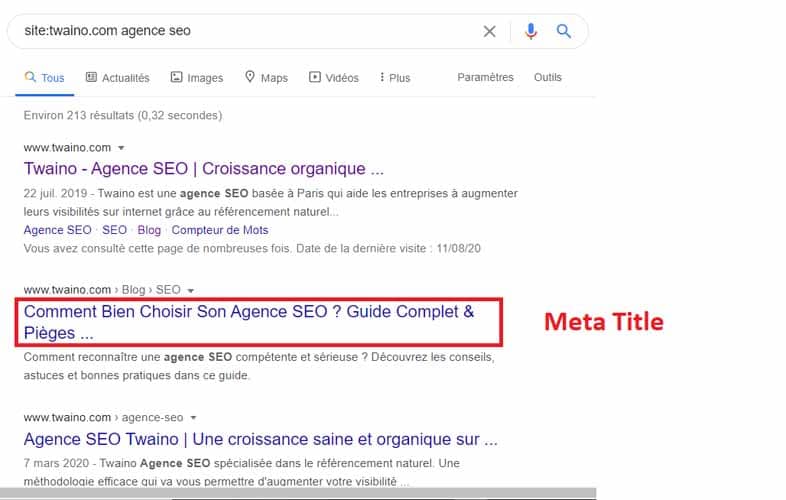
Here are these main roles
- It gives search engines a big clue about what the content is about;
- It is displayed in the search results (first line of the search snippet) to give users an idea about the content of the site;
- It is displayed as a tab title in browsers;
- It is displayed as the title of an article when it is on social networks.
3.2.2. Meta Descriptions tag
The meta description tag tag has this format:
It is displayed in the search results (second line of the search snippet).
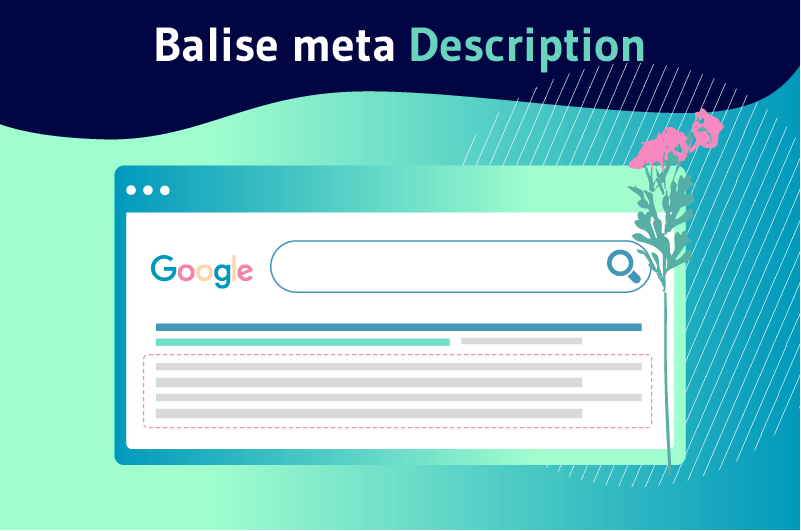
This tag is important for SEO, because :
- A compelling meta description tag will encourage users to click on your search snippet, which means more traffic and a higher CTR (click-through rate).
- Search snippets with a CTR are more likely to appear in the top positions of the results than snippets with a low CTR.
- Search engines tend to highlight search terms that appear in a meta description tagtag, which makes them more relevant to users, and subsequently leads to more clicks.
For more information on how to best optimize your meta description tags for SEO, take a look at the following guide Definition of the meta description tag.
3.2.3. Meta Robots tag
The meta robots tag tag has the following format:
< ! DOCTYPE html>
( …)
< /head>
( …)< /body>
< /html>
It is used to tell Google how a particular page should be treated.
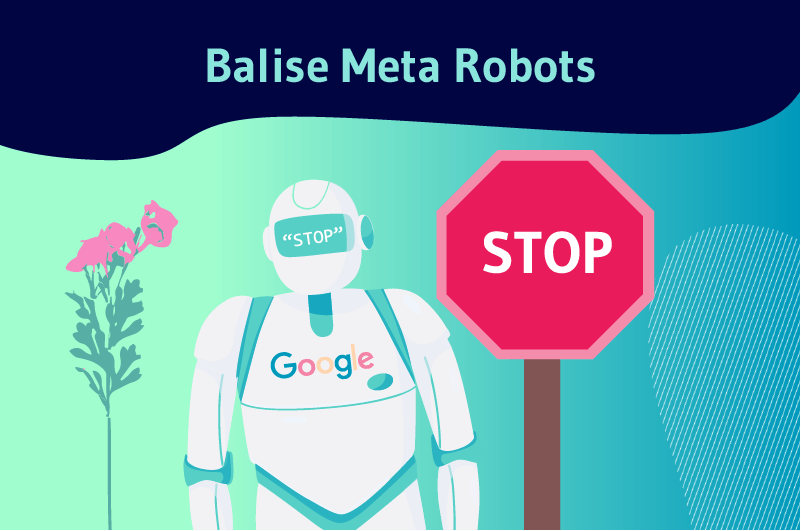
These are the main ones values (directives):
- Index – Allow Google’s robots to Index a page and display it in search results;
- Follow – Tells Google to Follow external links found on the page;
- Noindex – Tells Google to Not to index the page and also prohibits its display in search results;
- Nofollow – Specifies to Google to Not to follow the external links of this page.
Meta robots are important for SEO, as a wrong configuration can lead to a page not being indexed by search engines and that means no ranking and no traffic.
For more information on the meta robots tag, please consult the following guide Definition of the meta robots tag.
Chapter 4 : Other questions asked about the meta keywords tag
4.1. What is a meta keywords tag?
The meta keywords is a specific type of meta tag that is embedded in the HTML code of a web page and used to tell search engines what the page is about. It has since been ignored by Google, Yahoo and Bing, so it is of little importance.
4.2. how are the keywords placed in the meta keywords tag ?
The keywords are placed in the meta keywords tag in the following format
“Meta name =” keywords “content =” keywords1, keywords2, keywords3, …., keywordsN “”
Note that the keywords of the web page are separated by commas.
4.3 Does Google use nowadays the meta keywords tag ?
Google does not use the meta keywords tag in the web ranking anymore. This tag is not followed by any major search engine and has no value in SEO. It is best to avoid this tag and let the search engines decide how to crawl your website.
4.4 Are the meta keywords tag and the keywords the same?
Google does not use the meta keywords tag, but it does use traditional keywords to help identify the relevance of a website to a user’s search. The search engine looks for keywords in the page content, URL, title tag and description tag to rank your website.
4.5. What are the right meta tags?
By using these meta tagstags, you can boost your website’s SEO:
- Title tag ;
- Meta Description ;
- Canonical tag ;
- Alternative text tag ;
- Meta Robots tag ;
- Open Meta Graph Tags and Twitter Cards;
- Header Tags;
- Responsive Meta Design tag.
In summary
The use of meta Keywords tags is a past SEO technique for Google, Bing and Yahoo. However, they are still taken into account by Yandex and Baidu.
Therefore, if you care about Yandex and Baidu traffic, you can add the meta Keywords tag to your pages, but it is very important that you do it correctly and avoid keyword stuffing.
Other meta tags on the other hand are very important for SEO in ALL search engines. So, as part of your On-page SEO, make sure you pay special attention to these meta tags.
I hope this guide has provided you with more value. If you have any questions, feel free to put them in comments.
See you soon!

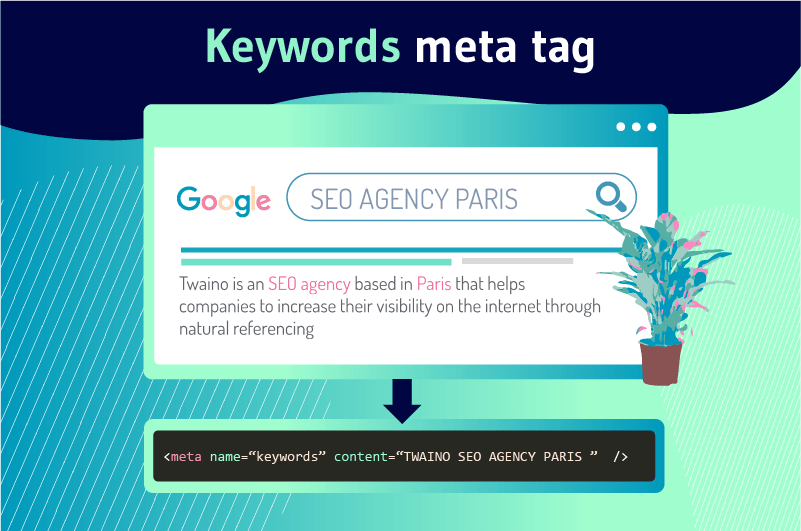


Based on your experience,
what’s your most performing strategy to increase organic CTR by optimizing title tag or meta description?